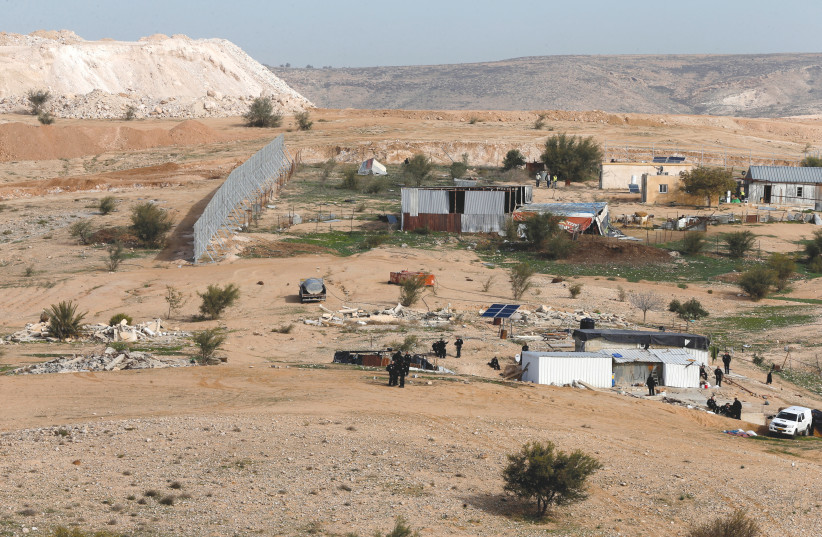The public debate between former state attorney Shai Nitzan and two former top Police Investigations Department officials over deaths at Umm al-Hiran continued to heat up on Sunday.
The latest round of controversy was started by former deputy PID chief Moshe Saada, when he told Channel 12 on July 25 that Nitzan and former police chief Roni Alsheich had blocked the PID from properly handling a deadly incident at the Bedouin village of Umm al-Hiran in January 2017.
During the incident, a policeman and a Bedouin were killed during protests over the state’s demolition of unrecognized Bedouin residences in the village.
Saada said the Bedouin, Ya’akub Abu al-Qi’an, was innocent and had been wrongfully killed by the police. Nitzan, who is above the PID, ruled that the evidence was mixed on whether al-Qi’an had terrorist motives, or ran over the policeman by accident.
Saada, however, has been attacking Nitzan and the entire prosecution for the last couple of years on a variety of cases. Some say he is angry about not getting the top PID job, or about the state prosecuting former prime minister Benjamin Netanyahu.

What supercharged the latest round was that Saada’s former boss, PID chief Uri Carmel, who had publicly stayed out of the issue until now, finally took off the gloves against Nitzan in an op-ed in Haaretz on Thursday.
That led Saada to criticize Nitzan and Alsheich on KAN on Sunday, and motivated Nitzan to push back against both of his detractors.
Some of the claims Carmel added to the discussion were that Alsheich tried to get his hands on an investigative document that the PID and the Shin Bet (Israel Security Agency) were using, in which the policeman who shot al-Qi’an might have confessed to opening fire without feeling threatened.
If Alsheich tried to get this from the Shin Bet, going around the PID at a time when the PID was probing the police, it would not reflect well on him.
Carmel also said Nitzan’s decision departed from the guidelines that he himself had promulgated on how to decide cases.
Moreover, Carmel said neither Nitzan nor the state prosecution provided the full picture to the High Court of Justice when the justices rejected a petition to reopen the probe in October 2021.
Issues with the investigation
In a previous interview with The Jerusalem Post, Nitzan revealed that the investigation found the types of problematic materials in al-Qi’an’s residence that often suggest a suspect had ideological motives.
He had said this evidence plus the unclear circumstances in which al-Qi’an ran over the policeman made it impossible to rule one way or the other. There is a debate as to whether al-Qi’an targeted the policeman or whether his limp, lifeless body fell on the gas pedal after he was shot, driving it forward.
He thought that the deceased man, al-Qi’an, was innocent, and wanted that to be the decision"
Shai Nitzan
“There were professional differences between me and Uri Carmel,” Nitzan said on Sunday. “He thought that the deceased man, al-Qi’an, was innocent, and wanted that to be the decision. I thought that it was impossible to reach a determination, and that in any case, it was not my role to decide, because my role was to decide whether to indict policemen or not. Uri did not accept my position, but as it is known, the state attorney is not a rubber stamp for anyone, not even the head of PID.”
Nitzan also referred to the High Court decision that echoed his view that the evidence was mixed.
In October 2020, then-prime minister Benjamin Netanyahu accused Nitzan of covering up the incident.
Netanyahu’s claims were likely part of a broader strategy to paint the prosecution as political, which would assist the former prime minister in delegitimizing the ongoing public corruption indictment against him.
At the time of the incident, Netanyahu and his then-public security minister Gilad Erdan expressed little to no sympathy for al-Qi’an, and fully backed Alsheich. It was only after Alsheich supported indicting Netanyahu that the prime minister and the Likud started to attack him and the prosecution.
Netanyahu himself was responding to a Channel 12 report that showed embarrassing internal emails between Nitzan and Carmel, in which they condemned the behavior of Alsheich for allegedly trying to cover for his officers.
